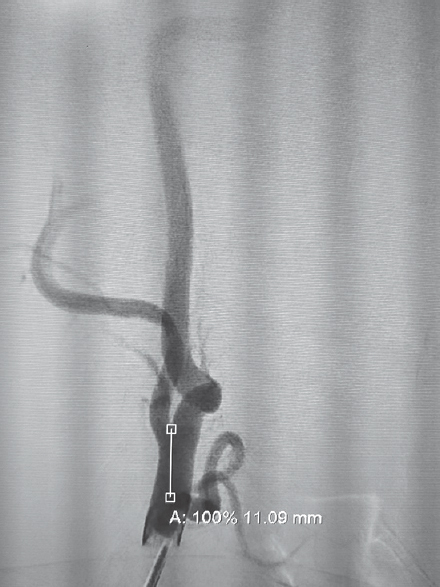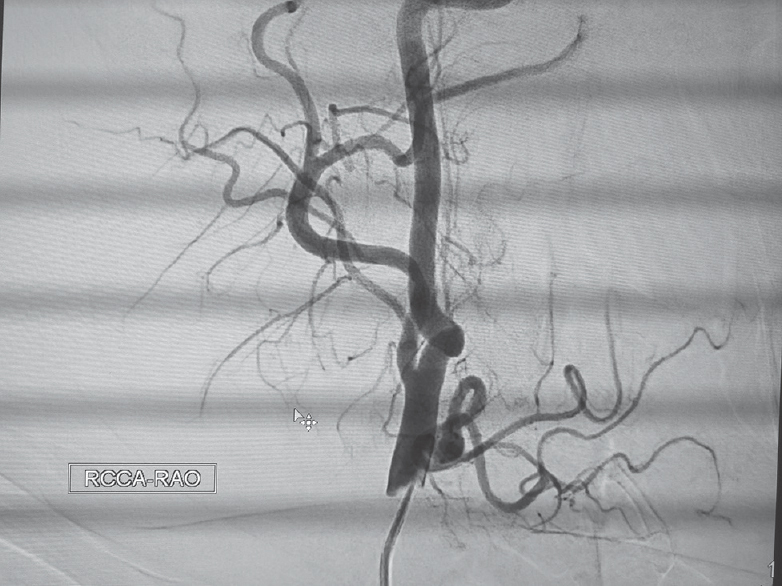Translate this page into:
Origin of Thyrolingual Trunk from the Common Carotid Artery
Address for correspondence: Dr. Sumit Goyal, Institute of Neurosciences, Pushpawati Singhania Research Institute Hospital, New Delhi, India. E-mail: drgoyalsumit@gmail.com
This is an open access journal, and articles are distributed under the terms of the Creative Commons Attribution-NonCommercial-ShareAlike 4.0 License, which allows others to remix, tweak, and build upon the work non-commercially, as long as appropriate credit is given and the new creations are licensed under the identical terms.
This article was originally published by Medknow Publications & Media Pvt Ltd and was migrated to Scientific Scholar after the change of Publisher.
Abstract
Common carotid artery (CCA) usually does not have any branches in the neck and divides into internal and external carotid artery. Superior thyroid and lingual artery (commonly called as thyro lingual trunk) are the branches of external carotid artery. We report a case of rare origin of thyrolingual trunk from the CCA in a case of ruptured intracranial aneurysm.
Keywords
Carotid branches
common carotid
thyrolingual trunk
INTRODUCTION
Common carotid artery (CCA) originates from the brachiocephalic trunk on the right side and as direct branch of the arch of aorta on the left side. Usually, CCA does not give any branch in the neck. However, anatomical variation in the bifurcation and branching is known and documented by various authors.[1] Rarely, the CCA is absent and both external and internal carotid artery may have separate origins.[2] In this case, we report a rare case of thyrolingual trunk originating from the CCA incidentally detected in a patient with ruptured posterior communicating (P.com) artery aneurysm.
CASE REPORT
A 45-year-old male presented to the emergency department with sudden-onset headache and vomiting 5 days back. His computed tomography scan of head revealed diffuse subarachnoid hemorrhage. His cerebral digital subtraction angiography (DSA) was then performed, which revealed a multilobed P.com artery aneurysm which was then successfully coiled and the patient was later discharged with the modified Rankin score of 0. His DSA also revealed an incidental rare finding of common origin of superior thyroid and lingual artery from the CCA which are normally the branch of external carotid artery [Figures 1 and 2].

- Oblique early arterial digital subtraction angiography of the right common carotid artery showing origin of thyrolingual trunk 11 mm proximal to common carotid artery bifurcation

- Oblique digital subtraction angiography arterial phase showing the origin and distribution of thyrolingual trunk from the common carotid artery
DISCUSSION
CCA originates from the brachiocephalic artery on the right side and from CCA on the left side. Usually, the CCA and internal carotid artery do not give any branches in the neck while external carotid artery gives eight branches in the neck. Rarely, thyroid ima artery may originate before the bifurcation.
Common origin of facial and lingual artery from external carotid artery is known as faciolingual trunk. Origin of thyrolingual trunk from external carotid artery has been reported with an incidence of 0.7%–3%.[3] In the present case, the origin of thyrolingual trunk is from the CCA, approximately 11 mm proximal to the bifurcation which is even rarer [Figures 1 and 2].
Lippert et al. reported that the incidence of thyrolingual trunk arising from CCA was <0.1%.[4]
In 2013, Kapre et al. from India reported two cases of thyrolingual trunk, of them one was arising from CCA, 17 mm below the bifurcation, and the other was arising from the carotid bifurcation.[5] Lemaire et al. reported a case of thyrolingual trunk arising from the right CCA, 30 mm below the carotid bifurcation.[6]
Although the finding of proximal origin of the thyrolingual trunk from CCA was incidental in this case, variation in the branching pattern of the carotid arteries is important for the head and neck surgeons. It is important to identify branches originating from the CCA during neck exploration and avoiding the mix up with external carotid artery. Knowledge of anatomical variation is equally important during neuroangiographic procedures and embolization of head and neck tumors through branches of external carotid artery.
Declaration of patient consent
The authors certify that they have obtained all appropriate patient consent forms. In the form the patient(s) has/have given his/her/their consent for his/her/their images and other clinical information to be reported in the journal. The patients understand that their names and initials will not be published and due efforts will be made to conceal their identity, but anonymity cannot be guaranteed.
Financial support and sponsorship
Nil.
Conflicts of interest
There are no conflicts of interest.
Acknowledgment
We would like to acknowledge Dr. Shamsher Dwivedee, Director, Institute of Neurosciences, and Dr. Pratibha Kujur, Consultant Neuroanesthetist, Pushpawati Singhania Research Institute Hospital, New Delhi, India, for their support.
REFERENCES
- Unilateral anomalous left common carotid artery; a case report. Ann Anat. 1996;178:477-80.
- [Google Scholar]
- A rare case of absent left common carotid artery with bovine origin of the left external carotid artery. J Neurointerv Surg. 2017;9:e20.
- [Google Scholar]
- Anomalous origin of thyrolingual trunk from right common carotid artery – A case report. J Anat Soc India. 2001;50:47.
- [Google Scholar]
- Arterial Variations in Man: Classification and Frequency. Munchen: J.F. Bergan Variag; 1985. p. :83.
- Study of thyro-lingual trunk and its clinical relevance. Indian J Otolaryngol Head Neck Surg. 2013;65:102-4.
- [Google Scholar]
- Thyrolingual trunk arising from the common carotid artery: A case report. Surg Radiol Anat. 2001;23:135-7.
- [Google Scholar]






